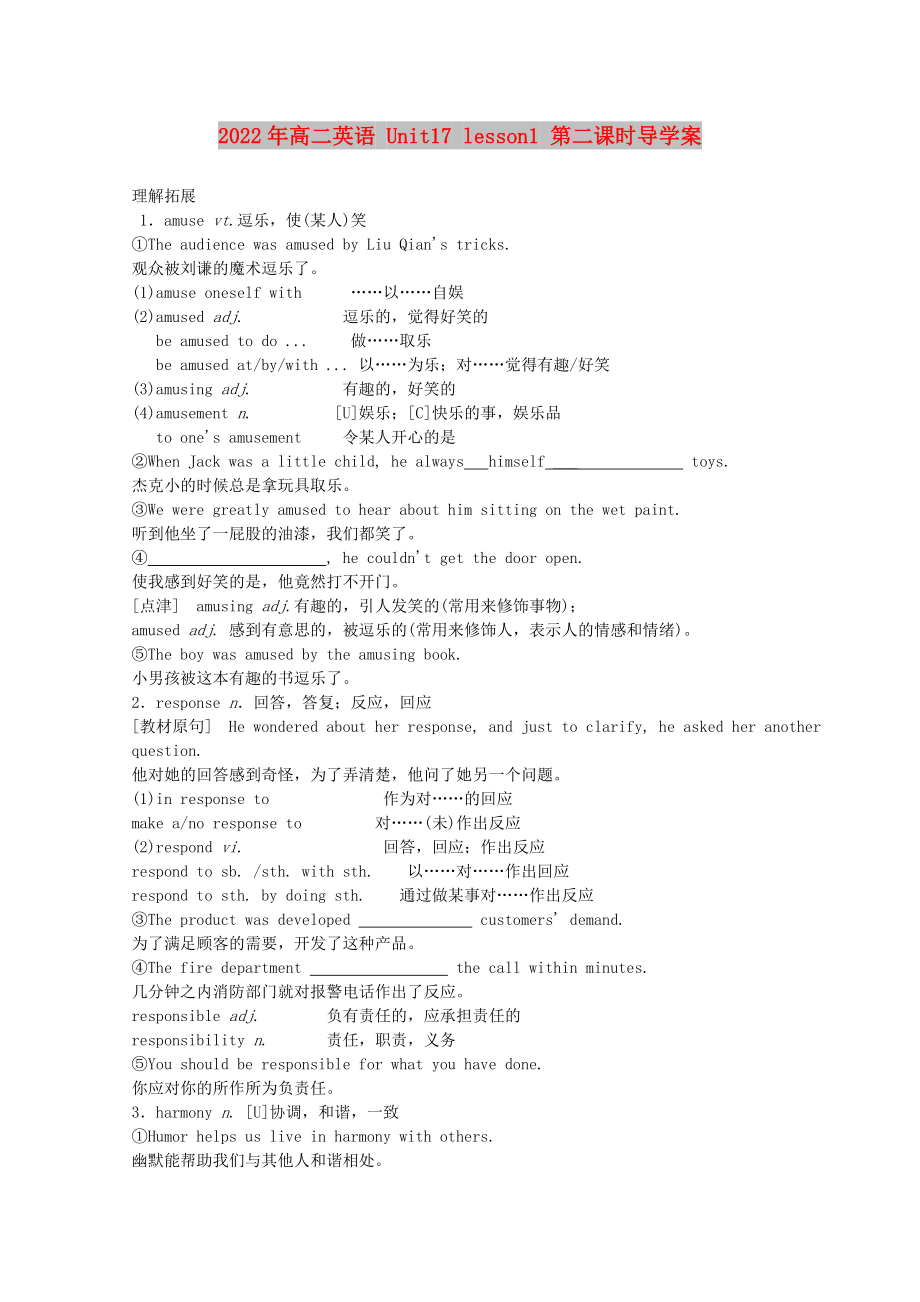《2022年高二英語 Unit17 lesson1 第二課時(shí)導(dǎo)學(xué)案》由會(huì)員分享��,可在線閱讀�����,更多相關(guān)《2022年高二英語 Unit17 lesson1 第二課時(shí)導(dǎo)學(xué)案(3頁珍藏版)》請(qǐng)?jiān)谘b配圖網(wǎng)上搜索�。
1、2022年高二英語 Unit17 lesson1 第二課時(shí)導(dǎo)學(xué)案
理解拓展
1.a(chǎn)muse vt.逗樂���,使(某人)笑
①The audience was amused by Liu Qian's tricks.
觀眾被劉謙的魔術(shù)逗樂了�����。
(1)amuse oneself with ……以……自娛
(2)amused adj. 逗樂的��,覺得好笑的
be amused to do ... 做……取樂
be amused at/by/with ... 以……為樂�;對(duì)……覺得有趣/好笑
(3)amusing adj.
2��、 有趣的���,好笑的
(4)amusement n. [U]娛樂��;[C]快樂的事�,娛樂品
to one's amusement 令某人開心的是
②When Jack was a little child, he always himself ___ toys.
杰克小的時(shí)候總是拿玩具取樂��。
③We were greatly amused to hear about him sitting on the wet paint.
聽到他坐了一屁股的油漆�����,我們都笑了��。
④ , he
3�����、 couldn't get the door open.
使我感到好笑的是,他竟然打不開門����。
[點(diǎn)津] amusing adj.有趣的,引人發(fā)笑的(常用來修飾事物)���;
amused adj. 感到有意思的���,被逗樂的(常用來修飾人,表示人的情感和情緒)����。
⑤The boy was amused by the amusing book.
小男孩被這本有趣的書逗樂了。
2.response n.回答��,答復(fù)�;反應(yīng),回應(yīng)
[教材原句] He wondered about her response, and just to clarify, he asked her another ques
4�、tion.
他對(duì)她的回答感到奇怪,為了弄清楚��,他問了她另一個(gè)問題���。
(1)in response to 作為對(duì)……的回應(yīng)
make a/no response to 對(duì)……(未)作出反應(yīng)
(2)respond vi. 回答��,回應(yīng)�����;作出反應(yīng)
respond to sb. /sth. with sth. 以……對(duì)……作出回應(yīng)
respond to sth. by doing sth. 通過做某事對(duì)……作出反應(yīng)
③The product was developed custo
5��、mers' demand.
為了滿足顧客的需要�,開發(fā)了這種產(chǎn)品。
④The fire department the call within minutes.
幾分鐘之內(nèi)消防部門就對(duì)報(bào)警電話作出了反應(yīng)��。
responsible adj. 負(fù)有責(zé)任的��,應(yīng)承擔(dān)責(zé)任的
responsibility n. 責(zé)任�,職責(zé)�����,義務(wù)
⑤You should be responsible for what you have done.
你應(yīng)對(duì)你的所作所為負(fù)責(zé)任���。
3.harmony n. [U]協(xié)調(diào)����,和諧��,一致
①Humor helps us liv
6、e in harmony with others.
幽默能幫助我們與其他人和諧相處��。
be in harmony with 與……協(xié)調(diào)一致
be out of harmony with 與……不協(xié)調(diào)一致
live in harmony 和睦相處
harmonious adj. 調(diào)和的�,和諧的,均衡的
②We must ensure tourism develops the environment.
我們必須確保旅游業(yè)與環(huán)境協(xié)調(diào)發(fā)展�。
③The violin was out of harmony wi
7、th the rest of the instruments.
小提琴拉得與其他樂器不協(xié)調(diào)�。
4.withdraw vt.提取,收回���;(使)退出�����;撤離���,(使)撤回
[教材原句] I wanted to withdraw $40 from our bank account ...
我想從我們的銀行賬戶上取40美元……
①I wish to withdraw my offer to lend you the money.
我希望取消借錢給你的許諾。
withdraw sb./sth.from sth. 從……提?���。?使)撤回���;(使)退出
②There have been call
8�、s for Britain ____________the EU.
一直有人呼吁英國退出歐盟。
③The troops have been _________ from the danger area.
部隊(duì)已經(jīng)撤出危險(xiǎn)地帶����。
5.Overlook
[教材原句] He felt his daughter was mature enough and he didn't want to overlook her opinion ...
他覺得他女兒很成熟了,他不想忽視她的意見……
(1)vt.忽視����,忽略;不予理會(huì)����;未注意到
①Be careful! It's easy to ove
9、rlook these small details.
細(xì)心點(diǎn)��!這些細(xì)枝末節(jié)很容易被忽略���。
②They found some important evidence that the police .
他們發(fā)現(xiàn)了一些警察沒有注意到的重要證據(jù)。
(2)vt.俯瞰����,俯視
③We stand on the hill overlooking the valley.
我們站在山上俯瞰著山谷。
6.clarify vt.澄清��,講清楚��,闡明
①The teacher's explanation clarifies the puzzling problem.
老師
10、的說明澄清了困擾的問題�����。
clarify how /what ... 澄清/闡明……
clarify one's position 闡明立場
clarify a situation/problem 澄清情況/問題
clarification n. 澄清��;說明��,解釋
②The report aims these conclusions were reached.
那份報(bào)告旨在闡明這些結(jié)論是如何得出的����。
③I hope what I say can clarify my position.
我
11、希望我所說的能夠闡明我的立場����。
7.delay n.延誤,延期v.推遲�����;耽擱
[教材原句] Heavy snow last winter caused long delays at Heathrow airport.
去年冬天�,大雪導(dǎo)致了希思羅機(jī)場航班的長時(shí)間延誤。
①After a delay of one hour, we continued our journey.
耽擱一小時(shí)后�����,我們又繼續(xù)旅行。
②They agreed to delay the decision for as long as possible.
他們同意盡量推遲作出決定��。
one's delay in
12���、 doing sth. 某人延遲做某事
without delay 毫不耽擱���;立刻
delay doing sth. 推遲做某事
③I hope that discussions will take place .
我希望討論能立刻進(jìn)行。
④We on board for as long as we could.
我們盡可能推遲登機(jī)�����。
[點(diǎn)津] delay 用
13���、作動(dòng)詞時(shí)后面只能跟動(dòng)名詞作賓語�����,不能接不定式,類似的動(dòng)詞還有avoid, admit, advise, consider, enjoy, finish, forbid, give up, imagine, keep, mind, miss, practice, permit, resist, risk, suggest等����。
8.scared adj.驚恐的,擔(dān)驚受怕的
[教材原句] She was very scared.
她害怕極了。
①The boys were still standing there, too shocked and scared to move.
男孩子們?nèi)?/p>
14�����、站在那里����,嚇得呆若木雞,一步也不能動(dòng)彈���。
Be scared of doing …. 不敢做 be scared to do…. 害怕做
be scared that….害怕
Be scared to death 嚇得要命
[語境串記] The little girl _________ going across the bridge because she _________fall into the river.
小女孩不敢過橋��,因?yàn)樗ε碌暨M(jìn)河里���。
②We all we might lose our jobs.
我們大家都害怕失業(yè)。
課堂小結(jié):
答案
 2022年高二英語 Unit17 lesson1 第二課時(shí)導(dǎo)學(xué)案
2022年高二英語 Unit17 lesson1 第二課時(shí)導(dǎo)學(xué)案

